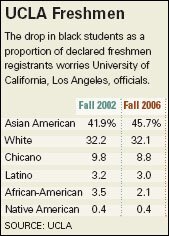The University of California, Los Angeles, is considering revamping its admissions policy, partly in response to concern over the shrinking number of African-American students enrolling in its freshman class.

Only 96 African-Americans—or 2 percent of the incoming freshman class—have said they plan to enroll in the university this fall, the lowest number and proportion since 1973.
Currently, one admissions reviewer considers an applicant’s academics, while another examines other factors, including “life challenges” such as the quality of the student’s high school. The proposed process would allow two reviewers to consider a student’s entire application to get a more holistic view.
The recent numbers for African-American admissions “heightened the need to take a hard look at our admissions process to make sure it is fair,” said Adrienne Lavine, an engineering professor and immediate past chairwoman of UCLA’s faculty senate.
The proposed policy has been agreed upon by one faculty committee, but still needs final approval from at least one other faculty panel, Ms. Lavine said.
California’s public colleges are barred from considering race in admissions decisions, under Proposition 209, a voter initiative approved in 1996. The proposed UCLA policy would not violate the law, said Ward Connerly, a leading proponent of the initiative. But the proposed policy shift might not benefit black students in the long run, he said.
“It’s going to be very clear that UCLA is reacting to pressure,” Mr. Connerly said, arguing that if UCLA admitted some black students under “a softer standard,” it would “marginalize” all African-American students.





